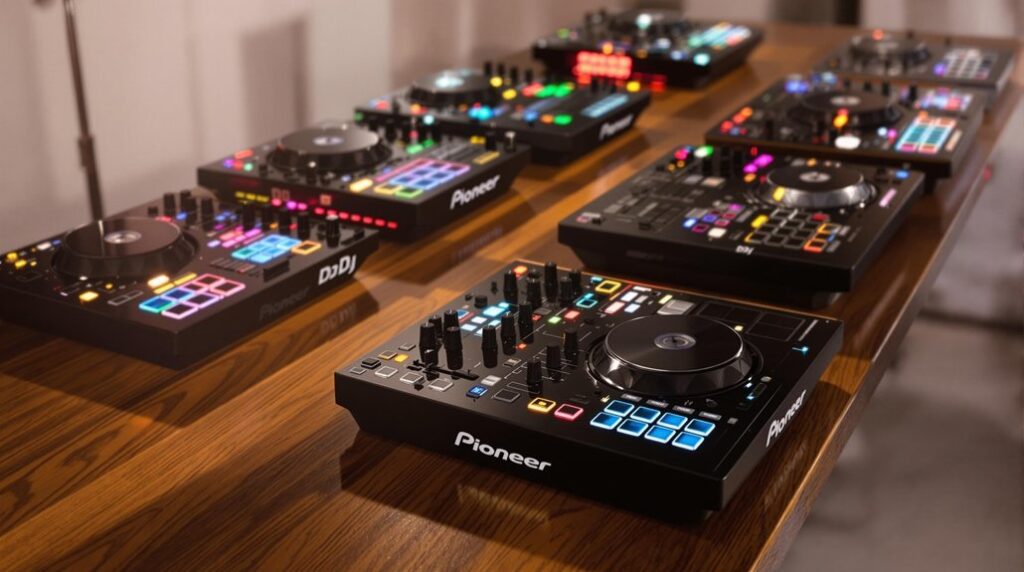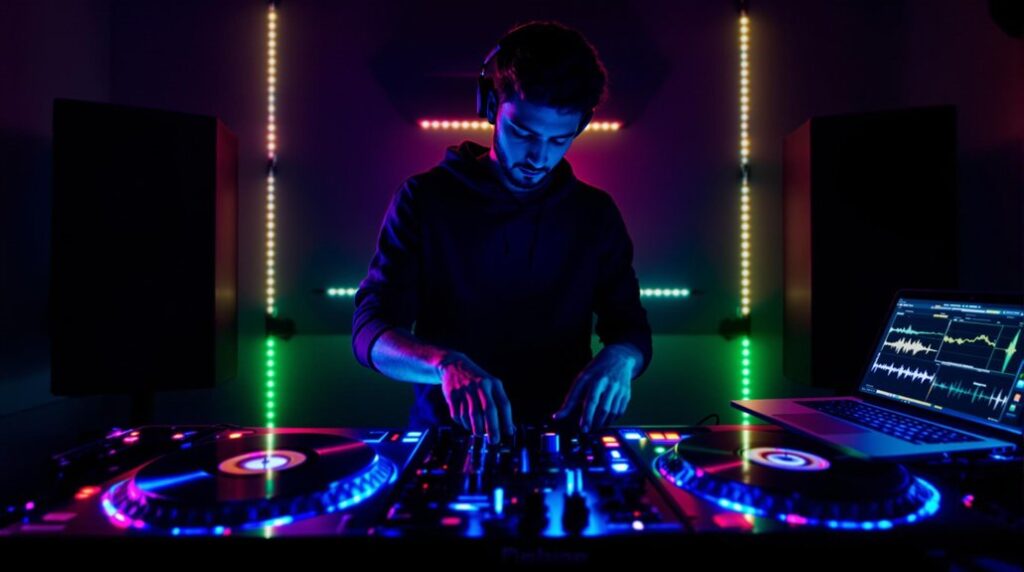Becoming a successful DJ involves honing essential skills, acquiring quality equipment, and mastering diverse music genres. Immerse in foundational techniques like beatmatching while developing a unique sound. Build a strong personal brand through consistent image and engaging content. Networking at events and utilizing social media boosts visibility. Understand legal and financial responsibilities, including music rights and budgeting. As skills grow, so too can the journey into the vibrant world of professional DJing. Exploring further offers valuable insights.
Key Takeaways
- Start with a laptop and DJ software to practice mixing and develop foundational skills.
- Build a diverse playlist and master beatmatching and EQ controls for quality mixes.
- Develop a unique personal brand through consistent social media presence and engaging content.
- Network with industry professionals and attend events to expand connections and opportunities.
- Understand music rights, explore diverse income streams, and manage finances for career sustainability.
Understanding the DJ Career Path
The DJ career path is a dynamic and multifaceted journey that has transformed considerably since its inception in the 1920s. Aspiring DJs navigate a environment enriched by diverse music genres, which are essential for curating a collection that aligns with their style and audience preferences. This understanding amplifies their performance potential. Modern DJing, buoyed by technological advances, allows easier entry into the field. However, beyond mastering equipment, success hinges on continuous skill development and adaptability to industry trends. Building a personal brand through networking and self-promotion is imperative, as it opens doors to gigs and collaborations. As the scene evolves, effective engagement with the community and relentless practice remain cornerstones for those pursuing a thriving DJ career.
Acquiring Essential DJ Equipment
Aspiring DJs, once familiar with the intricacies of the career path, must equip themselves with the right tools to bring their musical visions to life. Fundamental DJ equipment forms the backbone of any digital DJ setup. Beginner DJs often start with a laptop equipped with DJ software such as Serato, Traktor, or rekordbox, each offering free versions to explore mixing techniques. An entry-level DJ controller is a cost-effective choice, available from $100, allowing novices to hone their skills affordably. Quality headphones, ranging from $100 to $300, are essential for accurate track monitoring. Additionally, fundamental accessories such as USB drives for music library storage and necessary cables are critical for seamless connectivity. Choosing direct drive turntables is recommended for better torque and speed stability in DJ setups. Investing wisely in these components guarantees a solid foundation for any aspiring DJ.
Exploring and Curating Music Genres
To craft a distinct presence in the DJ world, one must immerse in a spectrum of music genres like electronica, hip-hop, techno, and house, which are essential for shaping a unique sound and grasping audience preferences. Building an eclectic playlist with 50-100 tracks, sourced from platforms such as Beatport and Bandcamp, allows DJs to create sets that reflect their personal style while resonating with diverse crowds. Mastering the art of mixing different genres not only enhances versatility but also keeps DJs in tune with current trends and audience expectations. Including tracks from timeless pop classics ensures DJs can cater to a wider audience, as these familiar tunes effectively engage listeners across different events.
Diverse Genre Exploration
Why does exploring a wide array of music genres matter for a DJ's journey? Immersion in diverse genres such as electronica, hip-hop, techno, and house is essential for a DJ to develop a unique musical taste that captivates audiences.
This exploration enhances their DJ sets, as curating a varied music collection of 50-100 tracks provides the foundation for practice. Digital platforms like Beatport, Bandcamp, and SoundCloud are invaluable resources for discovering new music and understanding current music trends.
DJs benefit from experimenting with mixing techniques across different genres, which raises their skill set and allows for the creation of distinct mashups and remixes. Additionally, DJ record pools offer access to fresh tracks, keeping sets dynamic and engaging.
Crafting Unique Playlists
Crafting unique playlists is an essential skill for any DJ seeking to leave a lasting impression on their audience. A well-curated music collection, rich in diverse genres such as electronica, hip-hop, techno, and house, is fundamental to developing a unique musical taste.
DJs can explore platforms like Beatport and Splice to source original tracks and remixes, which are vital to showcasing creative mixing skills. Regularly updating playlists guarantees they resonate with current trends and audience preferences.
Experimenting with mixing different genres allows DJs to create intriguing mashups and shifts that captivate listeners. By thoughtfully curating playlists, DJs can distinguish themselves in the competitive scene, offering dynamic and memorable sets that keep audiences engaged and entertained.
Developing DJ Skills and Techniques
Diving into the world of DJing requires mastering a set of foundational skills and techniques that form the backbone of every compelling performance. Essential DJ skills include mastering mixing techniques such as beatmatching and smooth shifts, utilizing EQ controls, and maintaining a well-organized music library. Regular practice and self-critique are vital for refining these skills. DJs should record their live performances to identify areas for improvement and integrate feedback effectively. Embracing technology, like DJ apps and digital tools, can enhance workflow and boost live performance capabilities. Understanding harmonic mixing is vital for creating seamless connections between tracks, enhancing the overall flow and experience for the audience.
| Core Skill | Description |
|---|---|
| Beatmatching | Aligning beats of two tracks for seamless mixes |
| Shifts | Smoothly moving between songs |
| EQ Controls | Balancing frequencies for sound quality |
| Music Library | Organizing tracks for quick access |
| Technology Use | Utilizing digital tools for enhanced mixing |
Creating Your Unique Sound and Brand
Crafting a signature style is pivotal for any aspiring DJ, as it involves blending various musical influences into a cohesive sound that captivates audiences. Equally important is developing a visual identity that complements this sound; a memorable DJ name, an eye-catching logo, and cohesive promotional materials should reflect one's artistic vision. By incorporating unexpected genres to surprise and captivate the audience, DJs can set themselves apart from competitors and continuously refine their unique sound.
Crafting a Signature Style
To carve out a unique space in the DJ world, one must explore the art of crafting a signature style that captivates and resonates with audiences.
Developing a distinct musical identity begins with experimenting across genres and infusing personal influences to craft a unique sound. A powerful brand identity is enhanced by selecting a memorable DJ name and consistently engaging with fans on social media.
Original music and remixes serve as a personal creative hallmark, differentiating DJs in a crowded industry. Analyzing successful DJs provides insight into effective branding strategies.
Sharing mixes on platforms like SoundCloud fosters audience engagement, helping build a loyal community. By mastering these elements, DJs can forge a signature style that is both compelling and recognizable.
Developing Visual Identity
A critical component of a DJ's success lies in developing a compelling visual identity that complements their unique sound and brand. This involves creating a distinctive name and visual style that reflects their musical persona. Consistency in promotional materials is essential for reinforcing the DJ's brand identity, ensuring cohesive marketing techniques across platforms. By analyzing successful branding strategies, DJs can refine audience engagement practices and incorporate creative content into their repertoire. Original music and remixes serve as a powerful tool to enhance a DJ's brand, offering unique material that distinguishes them in the market.
| Element | Purpose | Example |
|---|---|---|
| Distinctive Name | Brand recognition | DJ Shadow |
| Visual Style | Audience attraction | Colorful album covers |
| Consistency | Brand loyalty | Uniform social media |
| Original Music | Creativity showcase | Exclusive remixes |
| Marketing | Audience engagement | Interactive campaigns |
Networking and Self-Promotion Strategies
In the dynamic and often competitive world of DJing, effective networking and self-promotion strategies are essential for establishing a presence and advancing one's career.
DJs can leverage social media platforms like Instagram and SoundCloud to showcase their mixes, boosting visibility and attracting a loyal following. Attending music events and festivals provides valuable networking opportunities with fellow DJs and industry professionals, enabling potential collaborations.
Creating a compelling Electronic Press Kit (EPK) highlights a DJ's skills and contact information, streamlining outreach to venues and labels. Regularly posting engaging content, such as mixes and live performances, maintains audience interest.
Collaborating with other artists enhances reach and taps into new audiences, mutually expanding networks and fostering professional growth. Additionally, using high-quality visuals on social media can significantly increase engagement, helping DJs effectively convey their brand message and build trust with their audience.
While mastering networking and self-promotion bolsters a DJ's visibility, equally important is traversing the legal and financial environment of the profession. Understanding music rights and licensing is essential to avoid costly legal repercussions. DJs must familiarize themselves with contracts for gigs, which define payment terms, performance expectations, and cancellation policies, guaranteeing professional clarity. Budgeting for equipment and promotional expenses is vital, with costs ranging considerably based on gear choice. Exploring diverse income streams, including gig fees, merchandise sales, and music streaming royalties, enhances career sustainability. Public performance licenses are especially crucial for DJs performing in public venues, as they ensure compliance with copyright laws and protect against potential fines. Managing finances effectively, by tracking earnings and expenses, prepares DJs for tax obligations and assesses profitability. Mastering these aspects guarantees not only a legally compliant career but also one that is financially viable.
Frequently Asked Questions
How Long Does It Take to Become a Pro DJ?
The journey to becoming a pro DJ typically spans 1-3 years, focusing on mastering DJ equipment, diverse music genres, practice schedules, and networking tips. Emphasizing brand development, live performances, mixing techniques, music production, sound engineering, and social media engagement is essential.
How to Start DJING Professionally?
Starting to DJ professionally involves mastering DJ equipment essentials, mixing techniques basics, and building a music library. Understanding music genres, networking with artists, creating a brand identity, and utilizing social media strategies are vital for success and growth.
Is 25 Too Old to Become a DJ?
Age concerns in DJing are often misconceptions. Career shifts at 25 can become passion projects, especially for late bloomers. Skill development across music genres, networking opportunities, and equipment investments offer personal fulfillment, regardless of starting age.
How Much Should a Beginner DJ Get Paid?
A beginner DJ's pay varies based on skill level, event types, and local markets. Understanding industry standards and utilizing online platforms for gig opportunities can aid in negotiation. Building reputation gradually helps align with competitive payment structures.
Conclusion
In mastering the DJ journey, one transforms from a novice into a professional by understanding the intricate career path and acquiring essential equipment. By exploring diverse music genres and honing technical skills, a DJ crafts a unique sound and brand. Strategic networking and self-promotion enhance visibility, while astute navigation of legal and financial environments guarantees longevity in the industry. Embracing this multifaceted approach, aspiring DJs can successfully carve out their niche and thrive in the dynamic world of music.




